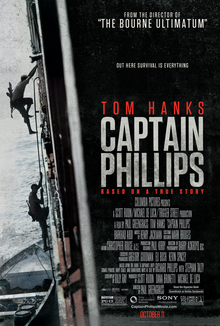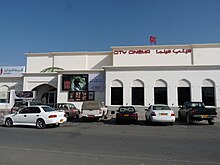
Hindi cinema, popularly known as Bollywood and formerly as Bombay cinema, refers to the film industry based in Mumbai, engaged in production of motion pictures in Hindi language. The popular term Bollywood is a portmanteau of "Bombay" and "Hollywood". The industry is a part of the larger Indian cinema, which also includes South Indian cinema and other smaller film industries.

Oman, officially the Sultanate of Oman, is a country located in West Asia. It is situated on the southeastern coast of the Arabian Peninsula, and spans the mouth of the Persian Gulf. It shares land borders with Saudi Arabia, United Arab Emirates, and Yemen, while sharing maritime borders with Iran and Pakistan. The capital and largest city is Muscat. Oman has a population of nearly 4.7 million and is ranked the 124th most-populous country. The coast is formed by the Arabian Sea on the southeast, and the Gulf of Oman on the northeast. The Madha and Musandam exclaves are surrounded by United Arab Emirates on their land borders, with the Strait of Hormuz and the Gulf of Oman forming Musandam's coastal boundaries.

Konidela Chiranjeevi is an Indian actor, film producer and former politician who works predominantly in Telugu cinema. He is regarded as one of the most successful and influential actors in the history of Indian cinema. In a career spanning over four decades, he starred in over 150 feature films, predominantly in Telugu, as well as some films in Hindi, Tamil and Kannada. Chiranjeevi won the Andhra Pradesh state's highest film award, the Raghupathi Venkaiah Award, three Nandi Awards, and nine Filmfare Awards South including the Lifetime Achievement Award. In 2024, The Government of India honoured him with Padma Vibhushan, the second highest civilian honour. Earlier In 2006, he was honoured with the Padma Bhushan, India's third-highest civilian award, for his contributions to Indian cinema. In 2013, CNN-IBN named him as one of "the men who changed the face of the Indian Cinema".
The film industry or motion picture industry comprises the technological and commercial institutions of filmmaking, i.e., film production companies, film studios, cinematography, animation, film production, screenwriting, pre-production, post-production, film festivals, distribution, and actors. Though the expense involved in making films almost immediately led film production to concentrate under the auspices of standing production companies, advances in affordable filmmaking equipment, as well as an expansion of opportunities to acquire investment capital from outside the film industry itself, have allowed independent film production to evolve.

Penmetsa Ram Gopal Varma, often referred to by his initials RGV, is an Indian film director, screenwriter and producer, known for his works in Telugu cinema in addition to Hindi, Kannada language films, and television. Varma has directed films across multiple genres, including parallel cinema and docudrama noted for their gritty realism, technical finesse, and craft. Regarded as one of the pioneers of new age Indian cinema, he was featured in the BBC World series Bollywood Bosses in 2004. In 2006, Grady Hendrix of Film Comment, published by the Film Society of Lincoln Center cited Varma as "Bombay's Most Successful Maverick" for his works on experimental films.

Sneha Ullal is an Indian actress who has appeared in Telugu and Hindi films. She is known for her roles in the Telugu films Ullasamga Utsahamga, Simha and the Hindi film Lucky: No Time for Love.

Cinema of the Netherlands refers to the film industry based in the Netherlands. Because the Dutch film industry is relatively small, and there is little or no international market for Dutch films, almost all films rely on state funding. This funding can be achieved through several sources, for instance through the Netherlands Film Fund or the public broadcast networks. In recent years the Dutch Government has established several tax shelters for private investments in Dutch films.

Telugu cinema, also known as Tollywood, is the segment of Indian cinema dedicated to the production of motion pictures in the Telugu language, widely spoken in the states of Andhra Pradesh and Telangana. Telugu cinema is based in Film Nagar, Hyderabad. As of 2021, Telugu cinema is the largest film industry in India in terms of box-office. Telugu films sold 23.3 crore tickets in 2022, the highest among various film industries in India.
Arab cinema or Arabic cinema refers to the film industry of the Arab world. Most productions are from the Egyptian cinema.

The cinema of Bahrain is small as its lacks support from the government and the private sector. There are many short films produced by individual filmmakers, and about five feature films in Bahrain's history.

Cinema of the United Arab Emirates began with a number of feature films that were broadcast on national television since the late 1980s.

The cinema of Saudi Arabia is a fairly small industry that only produces a few feature films and documentaries every year. Theaters were closed after religious activism in the 1980s. With the exception of one IMAX theater in Khobar, there were no cinemas in Saudi Arabia from 1983 to 2018, although there was occasionally talk of opening movie theaters, and in 2008 conference rooms were rented to show the comedy Mennahi. Saudis wishing to watch films have done so via satellite, DVD, or video. Cinemas were banned for 35 years until the first cinema in Saudi Arabia opened on 18 April 2018 in Riyadh. AMC Theatres plans to open up to 40 cinemas in some 15 Saudi cities over the following five years. The government hopes that by 2030, Saudi Arabia will have more than 300 theaters with over 2,000 movie screens. Cinema of Saudi Arabia, whether locally-produced or foreign-sourced, is subject to Saudi censorship.
Stegath James Dorr is an American screenwriter, film actor and producer, credited under the screen name James Wagnor. He is noted for forming the commercial film industry in Oman beginning in 2006 with his association with Kamel Krifa and introducing the concept of the "global ensemble cast" which integrates a mixed international cast of actors who are each stars within their own countries to leverage the appeal of a film in different markets. According to the Oman Daily Observer, the country's largest English-language newspaper, Dorr's work in Oman has been instrumental in "sparking international interest in the Sultanate's potential as an exotic locale for film shoots." While Oman has long appealed to filmmakers for its extraordinary geography, obtaining permission to film in the country has been very difficult in the past and has previously only been granted to documentary filmmakers.

The Sundance Film Festival is an annual film festival organized by the Sundance Institute. It is the largest independent film festival in the United States, with more than 46,660 attending in 2016. The festival takes place every January in Park City, Utah; Salt Lake City, Utah; and at the Sundance Resort, and acts as a showcase for new work from American and international independent filmmakers. The festival consists of competitive sections for American and international dramatic and documentary films, both feature films and short films, and a group of out-of-competition sections, including NEXT, New Frontier, Spotlight, Midnight, Sundance Kids, From the Collection, Premieres, and Documentary Premieres. Many films premiering at Sundance have gone on to be nominated and win Oscars such as Best Picture, Best Director and Best Actor in a Leading Role.

Brenton Thwaites is an Australian actor. Beginning his career in his home country in 2011, he had a starring role on the series Slide and later appeared on the soap opera Home and Away. Since moving to the United States, Thwaites has had major roles in the films Blue Lagoon: The Awakening (2012), Oculus (2013), The Giver (2014), Gods of Egypt (2016), and Pirates of the Caribbean: Dead Men Tell No Tales (2017). He starred as Dick Grayson / Robin / Nightwing in the DC Universe / HBO Max series Titans from 2018 to 2023.

Captain Phillips is a 2013 American biographical action-thriller film directed by Paul Greengrass. Based on the 2009 Maersk Alabama hijacking, the film tells the story of Captain Richard Phillips, an American merchant mariner who was taken hostage by Somali pirates. It stars Tom Hanks as Phillips, alongside Barkhad Abdi as pirate leader Abduwali Muse.

Fire in the Blood is a 2013 documentary film by Dylan Mohan Gray depicting what it claims is the intentional obstruction of access to low-cost antiretroviral drugs used in the treatment of HIV/AIDS to people in Africa and other parts of the global south, driven by multinational pharmaceutical companies holding patent monopolies and various Western governments consistently supporting these companies. The film claims that the battle against what it refers to as a "genocidal blockade," which it estimates to have resulted in no less than ten to twelve million completely unnecessary deaths, was fought and won.
Dorr and Dörr are surnames of German origin. Notable people include:













